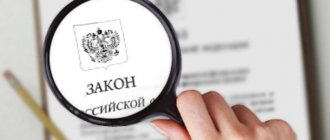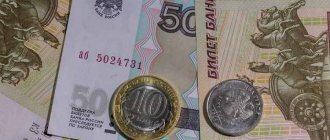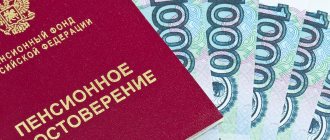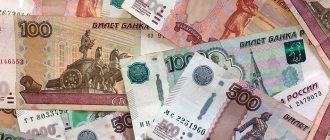Is the funded part of the pension inherited after death?
Yes, according to clause 6 of Article 7 of Federal Law No. 424, funds in the savings account are inherited if the pension has not yet been assigned to the deceased.
The payment is not reflected in the will and is not included in the total estate. You can receive funds within six months after death, and not after the end of 6 months, as in the situation with entering into an inheritance. If the heir applies after six months, he will receive a refusal, since the issuance deadline has been missed. The right to receive can only be restored in court. The list of valid reasons for missing a deadline is not established by law, but by analyzing court decisions, you can be convinced of the loyalty of the courts to reinstate the deadline. The following cases have been noted:
- Health problems of the heir. Certificates and medical reports will be required that will confirm the words (example: decision of the Oktyabrsky District Court in case No. 2-2519/2017 dated May 16, 2017).
- The relative’s ignorance of the deceased person’s insurer and the registration procedure due to legal illiteracy (appeal ruling of the Sverdlovsk Regional Court dated March 31, 2015 in case No. 33-4370/2015).
- Failure to notify PF beneficiaries about the possibility of receiving pension savings (appeal ruling of the Perm Regional Court dated March 19, 2013 in case No. 33-3237/2013).
- Ignorance of deadlines and procedures (decision of the Berezovsky City Court of the Kemerovo Region dated May 30, 2013 in case No. 2-294/2017).
The procedure for receiving a pension after the death of a pensioner: by power of attorney, by inheritance
Receiving a pension after the death of a pensioner by relatives implies the implementation of a set of measures, starting with the collection of documents, ending with their transfer to the authorized body and transfer of money to the card (payment in cash). How to receive a pension payment by inheritance and by power of attorney? What documents will be required first? We will consider these and other questions in the article.
Who is entitled to receive a pension?
Federal Law No. 400 states that the Pension Fund of the Russian Federation stops pension payments in the event of the death of the recipient of the funds. In this case, payments do not stop immediately, but from the 1st day of the month (the one following the month of the person’s death). For example, if a citizen died on October 20, payments are accrued until the 30th, but from November 1st they are no longer made.
Relatives (family members) who lived with the pensioner at the time of death have the right to take the remaining amount. We are talking about loved ones - grandchildren, sisters and brothers, children, and so on. These funds are not subject to inheritance, except in cases where the deceased left a will indicating the transfer of funds to specific persons, as well as in a number of other situations (discussed below).
The issue regarding additional payments deserves special attention. Depending on the type of such payments, different procedures for receipt are provided. Thus, some additional payments are inherited, while others are transferred according to the same algorithm as the unpaid pension. To avoid difficulties, it is important to contact the authorized body and clarify how to obtain such funds.
Application deadlines, what papers will be required?
To receive the funds mentioned above, relatives collect the necessary package of papers and apply to the Pension Fund of the Russian Federation within 6 months (six months) from the date of the citizen’s death. If several people claim money at the same time (provided that they have the right to count on payments), the available amount is divided into equal parts among everyone.
In the event that relatives do not apply to the Pension Fund to receive the remaining pension, the money is inherited on a general basis. A similar approach also applies if no one lived with the pensioner. The mentioned rules are stipulated in Federal Law No. 400, as well as the Civil Code of the Russian Federation (Article 1183). This also applies to additional payments, which are often transferred simultaneously with the pension.
To receive payments, you need to collect the following package of papers:
- An application requesting payment of the lost portion of the pension. The document is drawn up in a form that is fixed at the legislative level (a sample can be found in the territorial Pension Fund of the Russian Federation).
- Applicant's passport.
- A copy of the certificate confirming the death of a citizen of the Russian Federation. The document must be approved in the prescribed form.
- Papers confirming the fact of living with loved ones in the same housing, as well as proving family ties.
- Documentation with bank details. This will be required if the money is not transferred in cash, but is transferred to a card.
Papers confirming the fact of cohabitation include an extract from a personal document (passport), as well as:
- A certificate issued by the housing office or local authorities. It must contain information about registration at the address where the deceased pensioner lived. The certificate must indicate the basis for the issuance of funds.
- Certificate (a copy is sufficient) of registration at the place of stay (residence), certified in accordance with the requirements of the law.
It is important to know certain nuances when collecting papers confirming the fact of family ties. Such documentation includes birth and marriage certificates, as well as a passport. All documents can be submitted as a copy.
In addition, a certificate from the housing office, which indicates the composition of the family, is often used as supporting documents. It contains enough information to determine the fact of relationship.
In some cases, a judicial decision may be used in the form of supporting documentation.
Where to contact?
Above we looked at what documents are needed to receive the rest of the pension. As soon as the collections are completed, the papers must be submitted to the territorial body of the Pension Fund of the Russian Federation (the structure that paid the pension to the deceased citizen of the Russian Federation). There are no restrictions on the consideration period in the legislation, so when transferring papers you need to find out the time for consideration and decision-making.
Despite the absence of strict deadlines, PF employees must, within 3 days from the date of application, submit a certificate with information about the amount of pension payments.
That is, relatives applying for money must find out within 72 hours the exact amount they are entitled to.
Advice!
The certificate is issued on the basis of two papers - an application from a person who is authorized to receive these funds, or by filing a notarial request.
If the deceased pensioner was a military man, the principle of receiving the remaining part of the pension is different. According to the law, payment is made if the relatives buried the pensioner at their own expense. In other situations, only heirs can count on payments, taking into account the procedure specified in the law.
The procedure for receiving a pension by heirs
Taking into account the above, the conclusion suggests itself that the remainder of the pension is transferred to the heirs in the following cases:
- At the time of the pensioner’s death, none of his relatives lived with him.
- During the period stipulated by law, no one applied for payment.
- The pensioner was a former military man, and the relatives did not bury the deceased.
The heirs are relatives (primarily close ones), as well as disabled dependents living together or separately from the pensioner. The category of dependents includes persons who received payments from the deceased sufficient to live on.
Legal heirs should remember that not only the remaining amount of the pension passes to them (under certain circumstances), but also the debts of the deceased, as well as other obligations.
It is also worth considering that the pensioner, during his lifetime, could bequeath the remaining amount and other material assets to a specific heir.
There are cases when a citizen applies to the Pension Fund of the Russian Federation with an application for the disposal of money after death.
Another option is possible, when the pensioner draws up a will with the help of a notary body. If the Pension Fund of the Russian Federation (local branch) or a notary has such a document, the person (one or more) specified in the document has the right to receive pension savings.
It is worth noting that the insurance part of pension payments is not subject to inheritance. It is used to finance a pension in the event of the death of the breadwinner (assigned to the relatives of the deceased). This rule also applies to the basic part of pension payments, which is also not inherited.
After death, all the pensioner’s money from his personal personal account is sent to a special account of the Pension Fund of the Russian Federation. To receive savings, a person must fill out an application for receiving funds and submit it to the local Pension Fund department. The list of documents required for receipt is in many ways similar to the package discussed above. Here you will need:
- A copy of the death certificate.
- Statement.
- A certificate from a notary confirming the right to receive an inheritance.
Receiving a pension by proxy
Federal Law No. 173 (Article 18) states that a pensioner can issue a power of attorney and transfer the right to receive pension payments to another person. At the same time, it is important to comply with the procedure established in the laws of the Russian Federation.
The transfer of funds by proxy is carried out by employees of the organization involved in the delivery of funds.
Such companies, as a rule, are entrusted with the mission of verifying the correctness of the power of attorney and notifying persons about the rules for transferring pension payments.
A power of attorney to receive a pension is a special document that is drawn up in writing and issued by a pensioner to a third party. The person to whom such a power of attorney is written has the right to receive pension payments from the organization that delivers it.
Attention!
The paper must necessarily contain information about the place and date of execution, information about the person for whom the power of attorney is issued (full name, information from the passport and address), as well as similar data about the principal. In addition, the power of attorney lists the powers that the trusted party receives. A signature is placed at the bottom of the document and the validity period of the paper is indicated.
By law, a power of attorney is valid for a limited period of time. If the date is not specified during the registration process, the document is not valid. The maximum period for which a trust document is transferred does not exceed 3 years.
If the power of attorney is issued for a period that exceeds 1 year, it is valid for the entire period, but only under certain conditions. The pensioner must come to the authority that pays the pension every year and confirm the fact of registration. As a rule, it is necessary to contact the Pension Fund of the Russian Federation located at your place of residence.
To extend the period of validity of a power of attorney for a period of one year or more, it is necessary to prepare a package of papers, namely a passport (copy or original), a certificate of registration at the place of stay or residence (transfer of a certified copy is allowed), an extract from a personal document (passport), and also a certificate from the housing office or local registration authority.
It is worth understanding that receiving a pension by proxy after death is impossible. This is due to the fact that, according to the law, the mentioned document loses force in the following situations - upon expiration of the validity period, in case of cancellation by the principal, in case of refusal of the trusted party, as well as in the death of the pensioner. This also applies to cases where a person is classified as incapacitated or missing.
What other payments are due after the death of a pensioner?
Relatives of the old person to whom security was accrued have the right to withdraw the pension due in the current month, but not received due to death. If several family members apply for the specified amounts, all allocated funds are divided equally between them. You can receive the following types of pension benefits:
- cumulative;
- insurance;
- military
The territorial division of the Pension Fund of Russia (hereinafter referred to as the PFR) issues a certificate of the amount of benefits that were never paid during the lifetime of a registered citizen. Relatives of the deceased can receive a document within 6 months from the date of his death based on a request from a notary and upon application. Relatives also have the right to apply for a funeral benefit in the amount of 5,701.31 rubles according to the indexation carried out in 2019.
What payments can be received after the death of a pensioner depends on the social status of the deceased.
These include:
- regional allowances. This type is optional. The subject sets the payment, provided that the budget allows it;
- benefits for persons who served in military service. The value is equal to 3 pensions of a deceased citizen;
- help from the employer. Companies often specify in local regulations what assistance is available in the event of the death of an employee. Such an additional payment is not mandatory, that is, the company has the right not to pay anything.
You can apply for financial support if there is a reason for this.
After the death of a pensioner, payment of 2 pensions can be received immediately from the Pension Fund department
When all the documents have finally been collected, you can go to the territorial department of the Pension Fund to which the deceased pensioner was assigned.
Now the departments of the Pension Fund have developed an electronic registration system, and therefore there are no more queues and unnecessary running around the offices. If the package of documents is collected correctly, then you can receive payment of the required two pensions almost immediately at the Pension Fund cash desk.
Several relatives or dependents of the deceased pensioner can also submit documents to receive payments. The documents will be reviewed, and the payment of funds will be divided between the applicants in equal shares.
If, after the expiration of the period provided for by law, no one applies for payment of pensions, then the funds will go to the heir to the property of the deceased pensioner.
Why lie? There is no such. I personally contacted the Pension Fund and the hotline. They told me: “There is no such thing.”
Unfair laws, the Government is not for the population of Russia, but for the oligarchs. It’s time for this government to leave voluntarily, we don’t need Maidans.
Just a spit. 2 pensions - shame and disgrace. I don’t know who will decide to go pick it up.
Personally, the Pension Fund told me that nothing more was due... they only gave me 5000.00 for the burial... 8 months have already passed since my mother’s death.
Everything was written well, but there is no number of a single regulatory document. Either you have to hire special lawyers for money, or try to somehow talk to officials yourself without “bare” hands
I took a certificate from the Pension Fund of Russia, in front of me two women fought with this body, they were told that the money had been sent, they said that the money had not been received by the bank, in their words (women) this nonsense has been going on for a long time, and no one at the Pension Fund of Russia will do anything does not answer, the debate in my presence lasted 1.5 hours.
I’m wondering what identification documents a deceased person can have if they are immediately confiscated?
And after a pensioner with a mortgage dies, relatives have the right to pay the bank until the very end.
I wonder when this law appeared, why we didn’t know anything about it before? Many pensioner parents died, and no one reported this anywhere; they paid only 1 pension for the current month in which the pensioner died. As always, as far as payments are concerned, it is a closely guarded secret; you find out about them by accident.
and they told me at the pension that nothing was due because the pensioner received everything for the current month
Every person sooner or later comes to the end of his life's journey and then, relatives and close people, voluntarily accept obligations to organize a worthy burial. A special category of citizens are elderly people who receive social benefits from the state. The article will tell you what payments are due after the death of a pensioner and who can apply for posthumous financial assistance.
Currently, compensation is due in connection with the death of an elderly person and this right is enshrined at the federal level. This issue is regulated on the basis of Federal Law No. 8 “On burial and funeral business.” The list of services that government agencies provide free of charge includes the following:
- registration of all necessary documents;
- provision of a coffin;
- transportation of the deceased to the burial site
- direct burial of a deceased pensioner.
The listed services are specialized and are required when organizing a funeral. Every citizen involved in arranging a burial has a choice. On the one hand, a person can pay for all services on his own, and then submit checks for reimbursement. On the other hand, relatives and friends can apply for the funeral benefit provided by the state from the social authority in cash equivalent. Let's consider a possible solution to the issue in more detail.
Do I need to enter into an inheritance to receive
According to the law, the funded part is paid within 6 months and only after a relative submits an application.
The inheritance procedure takes place according to law (general grounds) or upon application to the Pension Fund. In a will, a person has the right to indicate the recipient and his share. In case of succession, the funds will be transferred to close relatives in the first line in equal shares. If there are none, then the second one.
There are a number of conditions under which a funded pension can be inherited, and if at least one of them is not met, the heirs will not be able to receive the funds:
- The citizen was a participant in the compulsory pension insurance program. Deductions were made to his account in a state or commercial pension fund. If savings have not been formed, then there is nothing to inherit.
- The person who made pension savings died before reaching retirement age. Thus, the savings part remained untouched.
- The testator reached retirement age, but did not apply for a pension. Savings are not inherited if the pension was received at least once.
More on the topic Pension in Arkhangelsk and the Arkhangelsk region
Regulatory and legislative framework
| Federal Law of the Russian Federation (hereinafter referred to as the Federal Law of the Russian Federation) dated January 12, 1996 No. 8-FZ | |
| Art. 9 | About the guaranteed list of funeral services and their cost |
| Art. 10 | About social benefits for burial, its amount |
| Federal Law of the Russian Federation dated December 28, 2013 No. 400-FZ | |
| pp. 1 clause 1 art. | On the termination of the accrual of security from the first day of the month following the one in which the death of the pensioner occurred |
| clause 4 art. 26 | On the procedure for receiving the unpaid portion of the insurance benefit to the deceased |
| On the procedure for calculating payments to military pensioners: | |
| RF PP dated September 22, 1993, No. 941 | |
| Decree of the Government of the Russian Federation (hereinafter referred to as the RF PP) dated 05/06/1994 No. 460 | and standards for spending money on their burial |
| Art. 63 Law of the Russian Federation of February 12, 1993 No. 4468-I | and relatives in the event of their death |
| RF RF dated August 18, 2010 No. 635 | On payments of pension savings to the legal successors of a deceased insured person, inheritance procedure |
| RF PP dated 07/07/2012 No. 694 | |
The procedure and terms for receiving the funded part of the pension of a deceased person
To register and receive a pension of a deceased citizen, you must adhere to a number of formalities. The procedure is not particularly difficult:
- Collect a package of necessary documents - it will depend on the length of service, status and position of the deceased before death.
- Submit the relevant papers and an application for registration of the lost pension to the authorized body responsible for its calculation.
- Wait for the pension to be transferred to the bank account specified in the details.
If the insured person kept pension accruals in a non-state or state pension fund and died before reaching retirement age, then the money is due to persons who are legal heirs or citizens who are indicated in the application drawn up by the insured person during his lifetime. In an agreement with the Pension Fund of the Russian Federation, the citizen himself determines to whom and what share of the funds goes.
If the instructions are not noted, then payments will be provided in equal shares and in order of priority:
- children, adopted children, father, mother, spouses (wife or husband);
- brothers, sisters, grandchildren, grandparents. At the same time, according to clause 8 of Article 7 of Law No. 424-FZ, relatives of the second stage will be able to receive money only if there are no legal successors of the first stage.
After the Pension Fund reports death, within two months the legal successors receive a notification about the right to receive a funded pension. In practice, the Pension Fund may not know about the death of a person or his relatives and may not send a notification. However, this does not deprive them of the right to receive shares upon circulation within six months from the date of death. The missed deadline can only be restored through the courts. The Pension Fund of Russia does not have such a right.
To obtain information on questions, you must contact the Pension Fund office and provide a certificate of death and relationship with the insured. Information about the account status is provided. Savings are kept in a non-state fund. This information will also be passed on to the heir.
More on the topic Regional maternity capital in Ryazan and the Ryazan region in 2019-2020
The application must be submitted to the NPF or Pension Fund, depending on the location of the personal account. You can also send the papers by mail, but the application will have to be notarized. To do this, we send a registered letter in A4 format with a notification to the fund. Postal employees will issue a receipt with a special code. It tracks the receipt of documents by the fund.
Within six months after the opening of the inheritance (death of the testator), his relatives must contact a notary to distribute the property between them. If this was not done within six months, the heirs lose their rights to the property of the deceased, incl. for his funded pension.
To receive savings, the heir should contact the pension fund where the pension was formed, where you will need to provide the following documents:
- identity card - passport;
- SNILS of the deceased;
- death certificate of a relative;
- document confirming family ties - marriage or birth certificate;
- court ruling, if the right of inheritance was determined by the court.
To inherit a pension formed from maternity capital, the father must provide birth certificates of the children and a document confirming adoption (if required). If there is no father, or he was deprived of parental rights, then a child under the age of majority or a student under 23 years old can inherit savings from maternal capital.
The specialist accepting the documents issues a receipt to the applicant. Documents are reviewed within 5 days - the time frame may be extended if there are several applicants for savings. As soon as a positive decision is made and the shares are distributed among all applicants, the funds will be transferred to the heirs’ account after the 15th day of the month following the one in which the application was submitted.
Procedure for receiving an unclaimed pension
To receive an insurance pension, you need to go to the Pension Fund office at the pensioner’s place of residence. If the deceased had pension savings, contact the Pension Fund or the Non-State Pension Fund. To receive a military pension after the death of a pensioner, legal successors must contact the appropriate department. If the funds were transferred to a bank card, you need to contact a notary to register the right to receive funds.
Labor pension
List of documents required to register unpaid funds for relatives of a deceased pensioner:
- a written request for payment of funds due to the deceased;
- applicant's passport;
- civil act proving the fact of death (certificate);
- certificate of family composition, passport extract on registration (necessary to confirm the fact of cohabitation of the applicant and the deceased);
- metrics (to establish relationship with mother/father or brothers/sisters), marriage certificate (to confirm marital relations);
- personal bank account number for transferring funds.
If the deceased’s pension is issued to a disabled person, the following papers are needed:
- child birth registration certificate;
- an extract from the decision of the medical and social examination confirming the applicant’s disability;
- certificate from the place of study.
Military pension
In the event of the death of a military pensioner or a person receiving a departmental pension, the procedure will be different. All family members of a military pensioner who were involved in the funeral can count on pension payments. In addition, the departmental pension cannot be included in the amount of the inheritance. To receive the required payments, you must contact the Ministry of Defense (or another department) and provide the following documentation:
- a document from the registry office registering the death of a pensioner;
- employment history;
- a certificate confirming the deceased’s involvement in a particular department;
- other documents on a general basis.
Who is entitled to departmental pensions:
- employees of the Ministry of Internal Affairs;
- military;
- customs and tax officials;
- employees of the Ministry of Emergency Situations.
Relatives who buried a WWII Veteran, Hero of Russia, have the right to compensation for funds spent on burial.
Important! Typically, all payments due to the deceased are accrued by the 15th of the next month after death.
Cumulative part of pension
In addition to the labor pension, a citizen could have a funded pension. Upon reaching retirement age, you can receive pension savings in the form of a lump sum or several payments over a certain period. A pensioner can also leave a funded pension to an inheritance fund. In the absence of a will, the savings are inherited by all legitimate claimants in equal shares.
Amount of funeral payments
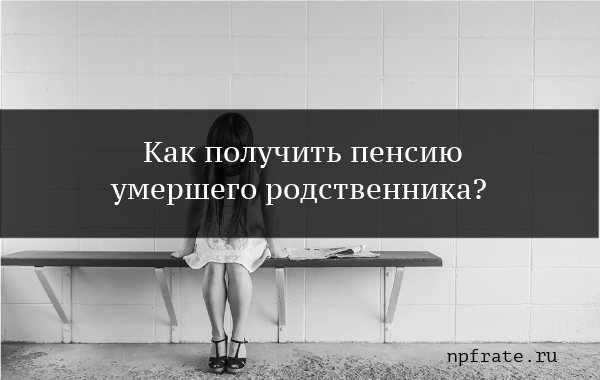
Federal Law No. 8 of 1996 “On Burial and Funeral Business” indicates that the amount of payments should not exceed the total cost of services guaranteed by the state.
Financial assistance is provided for:
- paperwork;
- making payment for the coffin;
- transportation to the burial place;
- burial process.
Post-death benefits do not include the payment of expenses such as a wake or funeral service. These expenses are borne by the family of the deceased. As of 2020, relatives of a deceased pensioner are paid 6,000 rubles.
This amount is intended for a working or non-working citizen. Some regions set premiums depending on the financial capabilities of the budget. For example, in the capital the amount is 17,000 rubles, of which 11,000 is an allowance. The authorities of St. Petersburg set an increase of 7,600 rubles.
The total amount is 13,600 rubles.
To obtain information about the size of the deceased’s account, you need to contact the Pension Fund. Information about prescribed funds is provided only to relatives who have the necessary papers. The following documents will be required:
- death certificate;
- papers that confirm the relationship.
If an account is opened in a non-state fund, Pension Fund employees will tell you where to go to find out the amount.
Where does the money of deceased pensioners go?
According to official statistics, approximately 45 million people died in Russia between 1995 and 2015. Of these, the number of people who worked but have not reached retirement age is about 10 million. Meanwhile, employers monthly contributed 22% of their salaries to the Russian Pension Fund. Where are these funds? News.ru addressed this question to the leading analyst of the Otkritie Broker database, economist Andrei Kochetkov.
— The state pension system probably takes into account the fact that someone did not live to see retirement, right?
— The pension system implies a collective responsibility or obligation. That is, every working citizen contributes to the Pension Fund for himself and “for that guy.” In theory, each person should use the full amount of their contributions. However, some people live to reach retirement age and retire, some do not live long enough, and some live beyond the average retirement age. The financial management of the pension fund is organized in such a way as to provide existing pensioners with the necessary cash benefits.
— Most of all, the dissatisfied are concerned about the fate of pension contributions for those citizens who still did not live to see retirement or died shortly after retirement.
— Many years ago the government approved a funded pension. It implied the possibility of transferring one's funds to heirs if a person did not live to retirement age. These funds did not enter the pension circulation, but remained in private hands. But it was precisely this fact that ultimately led to the state’s abandonment of the system, which citizens began to like. It was assumed that the pensioner would have funds from the Pension Fund and a personal accumulated pension. Since our level of trust in government agencies is quite low, many have decided to leave the Pension Fund and give their savings to non-state funds. This, as they say, provided the Pension Fund with a long-term revenue deficit. For this reason, we have been freezing accumulative contributions that go to the general insurance fund for several years now. The most unpleasant thing is that the government is not yet going to even discuss the issue of returning these funds to citizens’ savings accounts.

Sergey Bulkin/News.ru
— According to some data, over 20 years the Pension Fund has received about 10 trillion rubles of pension savings from prematurely deceased citizens. Where did this money go?
“There is no reason to think that this money disappeared somewhere unknown. These funds are used in average calculations of pension payments. The figure looks impressive only in the amount over 20 years, and in terms of the annual expenses of the Pension Fund, these revenues do not occupy such a significant volume. The main thing is to understand that pension savings are, in fact, insurance contributions. That is, we all break down the insured event for everyone. Meanwhile, if we buy health insurance, this does not guarantee that we will certainly break our leg. However, each of us has the opportunity to heal a fracture if it happens. The same is true in the pension system. Each of us makes contributions, but we do not know our own destiny. Will we be able to live 60, 70 or 90 years. The questions that arise about the Pension Fund's expenses are a separate conversation about efficiency. For example, in Western countries it is customary to spend public finances only on the purchase of goods and services that are produced and carried out by domestic companies. Naturally, one can come up with a formulation under which it is possible to purchase imported goods in the absence of analogues. However, these conversations can be had about almost any area of government spending.
— What can be considered “doubtful items” on the Pension Fund’s list of expenses?
— Is it possible to purchase luxury cars produced abroad? Is it possible to use expensive equipment, build expensive offices, etc. That is, everything that goes beyond the generally accepted concepts of modesty.
- But it’s not only our Pension Fund that is guilty of this?
- In fact, all government agencies behave more wastefully than commercial companies, since the connection between the owner and the management apparatus is more extensive. Many justify this as the need to attract qualified personnel to a less prestigious industry in a competitive market. And if there are no parameters for limiting costs, and there is no feedback between efficiency and remuneration, then these questions will always exist. Therefore, calling on the Pension Fund to save money based on consciousness and conscience would be extremely irrational. Then it would be worth talking about the high salaries of doctors who do not treat, the salaries of janitors who do not clean, etc. That is, in the absence of clear rules and methods for determining the effectiveness of spending, calls to conscience do not have any rational load.

Sergey Bulkin/News.ru
— Does the economic situation allow government agencies to have entertainment expenses?
— In terms of direct efficiency, our government receives quite fair rewards, since the budget remains in surplus and the balance of payments is positive. That is, the government runs the state, which makes a profit. Another thing is that according to the Constitution of the Russian Federation, the government should strive to improve the lives of citizens, and not worsen it. The same yardstick can be used to measure the activities of the Pension Fund. The constant declaration of its unprofitability indicates the need to revise the cost structure, as well as methods for managing pension savings.
— Can you imagine a situation when people stop thinking about where the money of deceased pensioners went?
— There would be no questions for the Pension Fund if it remained in surplus and also constantly increased pension payments. However, such a state can only be achieved with honest planning of the pension system and a structured remuneration structure for labor efficiency. In addition, it is necessary to increase the transparency and understandability of pension savings. Let’s just say that within the framework of a funded pension, we annually receive letters where the accumulated amounts and the profit received on them are written down. In accordance with our choice, we can also choose payment schemes upon reaching retirement age. In the state Pension Fund everything is different. We do not know the amounts that are available to us, we have no idea how much and how we can receive. And the current obligations of the Pension Fund of Russia can be revised in 5-7 years, as has happened several times over the last quarter of a century. The more complex the system, the more difficult it is to understand and accept. Moreover, with the instability of the financial system, it is also difficult for citizens to accept any promises of the future, or even to do anything themselves. However, talking about independent savings, including pension savings, is a different story.
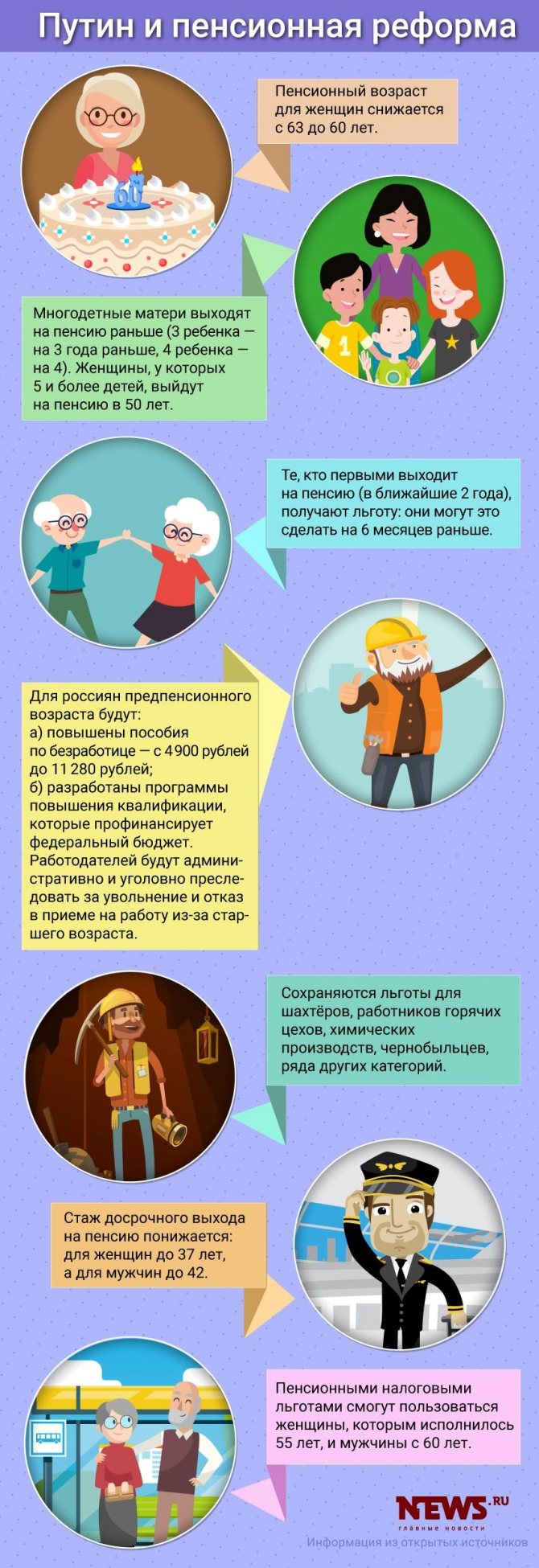
News.ru
— What would an ideal distribution scheme for Pension Fund funds look like?
— The bottom line is that the pension funds of prematurely deceased citizens are distributed among all participants in the pension system: whether they worked or not, lived only a little in retirement or extended their presence in our world to a hundred years. This is our common system of collective social security as a human community. As for the expenditure side of the Pension Fund, this is another problem, but all the funds that go into the pension system are then redistributed among all its participants. Accordingly, ideally it should be so that the pension system can meet its obligations annually and leave a small profit for future years in order to be able to increase pension payments in the future. Moreover, a developed pension system should not only provide disabled citizens with the means to subsist, but also provide the country's economy with capital for growth and improving overall well-being.
The most interesting things are in our Yandex.Zen channel
Amount of funeral payments
Speaking about what relatives are entitled to, it is necessary to note who has the right to seek help. This opportunity is provided to the citizen who is directly involved in organizing the burial process.
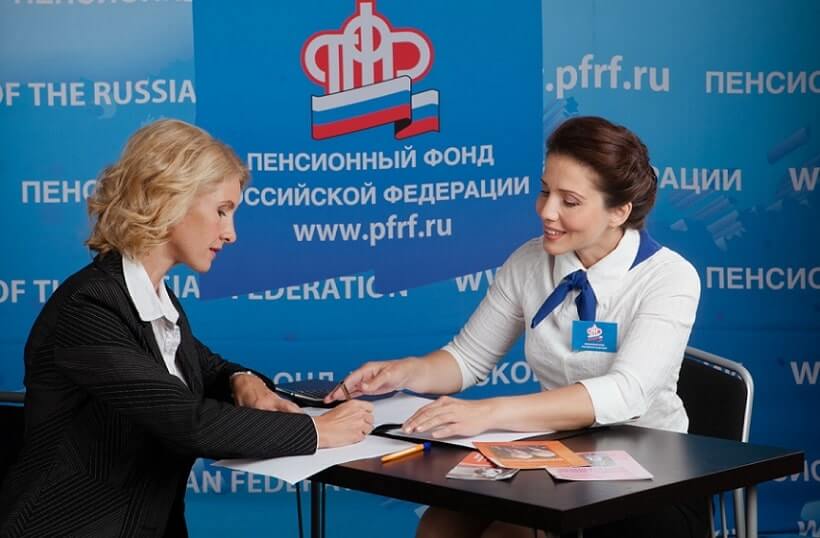
Including:
- any relative, regardless of the degree of relationship. Most often the spouse, children or parents apply. Sometimes brothers or sisters, nephews;
- legal representative;
- acquaintance or friend of the deceased. This happens when the deceased has no relatives or they refused burial;
- colleague or neighbor.
More on the topic Payments and benefits for pre-retirees in the Kirov region
The main condition is taking actions aimed at directly organizing the funeral.
Social subsidies for funerals are provided to compensate those responsible for part of the costs of the funeral of a deceased citizen. Payments of benefits are mainly carried out by the Pension Fund. Close relatives, family members or other persons - organizers who have taken responsibility for seeing off the deceased on his last journey have the right to apply for compensation for a funeral from the pension fund:
- preparation of necessary documents,
- purchase of a coffin and ritual accessories,
- transport,
- burial.
Where do you receive funeral benefits?
Several government departments have the right to issue compensation for funerals:
- Social Security Administration;
- Pension Fund;
- employer.
If a non-working pensioner dies, you should contact the Pension Fund where his pension was calculated. The address of the fund is determined by the pensioner’s place of residence, linked to the official registration.
If he was registered with the Veterans Council of an enterprise, which in the collective agreement has obligations for non-working pensioners, then benefits can be paid at the previous place of work.
If a working pensioner dies, you should contact your employer.
What documents are needed to obtain
To receive payment you will need the following list of papers:
- application for payment;
- death certificate;
- papers proving the identity of the heir;
- documents of the representative (birth certificate, passport of the representative), if the heir is a minor;
- papers that confirm relationship with the deceased. This could be a birth, marriage, adoption certificate;
- a power of attorney certified by a notary, if interests are represented by a trusted representative.
If the application for payment occurs after the trial, then the decision of the judicial authority. You can provide documents in person or with the help of a representative. When sent by mail or other method of transmission, copies of documents are certified by a notary. If the heir is abroad, then the package can be transferred through consular offices.
Papers in a foreign language are translated into Russian.
The Pension Fund and Non-State Pension Fund makes a decision on payment or refusal. A copy of the decision is sent to the heir by mail no later than 5 days after the decision is made.
What documents may be required during registration?
To receive financial assistance, the citizen who organized the burial must submit the following documents:
- a statement of the established form on behalf of the citizen who organized the burial;
- a person's civil passport;
- death certificate of the pensioner;
- work book of the deceased, which will indicate the fact of employment at the time of the citizen’s death.
For self-employed citizens, such a document is not needed, but an extract from the Social Insurance Fund will be required that the pensioner paid contributions to the Social Insurance Fund.
Registration procedure
To receive a funeral subsidy, the person responsible for the funeral of a pensioner must follow a certain procedure. Their step-by-step algorithm will look like this:
- Collect the necessary package of documents.
- Decide on the type of social benefit after the death of a pensioner.
- Submit documents and an application for receiving a funeral benefit to the authorized body responsible for its calculation.
- Wait for the transfer of funds due.
Is it possible to receive a deceased husband's pension?
The law clearly states that citizens recognized as disabled, who spent a long time with a deceased pensioner, can count on receiving a pension in connection with the loss of a breadwinner.
Many people are concerned about the question of whether a spouse can receive her husband’s pension funds on a monthly basis. The law guarantees the right to receive a survivor's pension not only for disabled people or minors, but also for citizens who lived at the expense of a deceased citizen and after his death lost their only source of livelihood.
However, if the parents or spouse of the deceased pensioner were not supported by the testator, they still have the right to apply to the Pension Fund for the purpose of receiving monthly payments in connection with the loss of a breadwinner. The widow has the right to apply to the Pension Fund at any time to transfer her husband’s pension to herself.
To do this, you need to prepare the following documents and come with them to the Pension Fund:
- Wife's passport;
- Marriage certificate;
- Death certificate of the spouse;
- SNILS of the deceased husband;
- Documentary confirmation of the fact of loss of basic income, most often a work record book is presented, on the basis of which a conclusion is drawn about the lack of income of the spouse;
- A document with information about the work activity and income of the deceased spouse.
